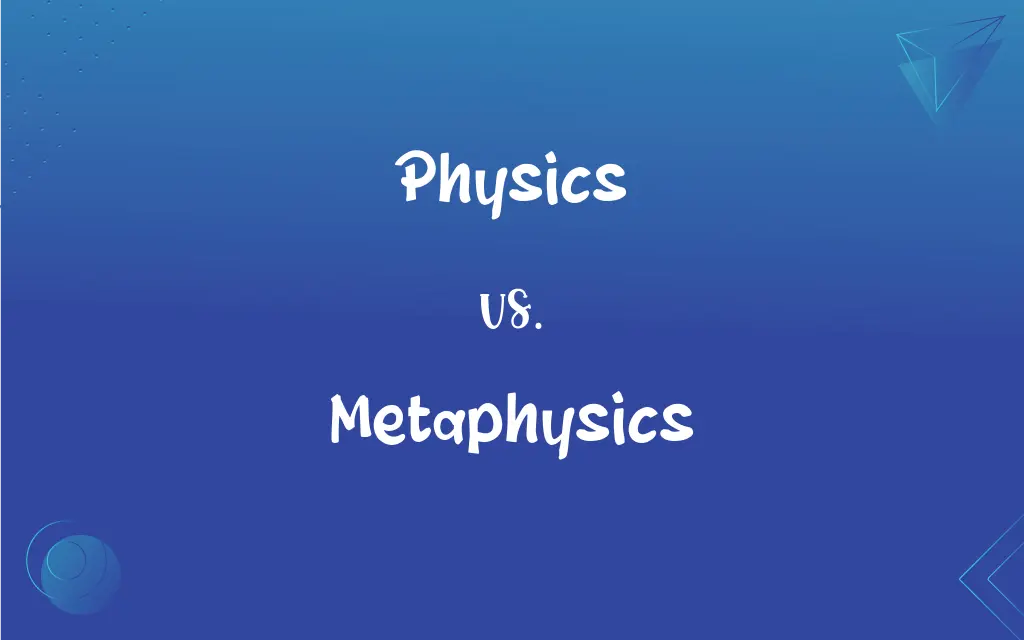Physics vs. Metaphysics: What's the Difference?
Edited by Janet White || By Harlon Moss || Published on December 7, 2023
Physics is the study of matter and energy and their interactions, whereas metaphysics explores the fundamental nature of reality beyond the physical.

Key Differences
Physics is a branch of science focusing on the study of the natural world, encompassing everything from subatomic particles to the behavior of galaxies. Metaphysics, on the other hand, delves into questions that transcend the physical realm, such as the nature of existence, reality, and the universe. While physics relies on empirical evidence and experimentation, metaphysics often employs philosophical inquiry and abstract reasoning.
In physics, theories and concepts like gravity, electromagnetism, and quantum mechanics are explored through observable and measurable phenomena. Metaphysics, in contrast, deals with concepts like being, identity, time, and space from a philosophical perspective. Where physics seeks to understand the laws governing the physical universe, metaphysics questions the very nature and structure of reality itself.
Physics uses mathematical models and experimental data to formulate laws and theories. It's grounded in the material world and its phenomena. Metaphysics, however, is not bound by physical laws or empirical evidence. It deals with abstract concepts such as existence, consciousness, and the relationship between mind and matter, which are often subjective and open to interpretation.
The methods of inquiry in physics are largely scientific, involving hypothesis testing, observation, and experimentation. Metaphysics, conversely, often relies on logical reasoning and philosophical debate. While physics aims to provide concrete answers and explanations, metaphysics is more about posing questions and exploring possibilities.
Physics has led to numerous technological advancements and a deeper understanding of the universe. Metaphysics, while not directly leading to technological inventions, contributes to our understanding of the philosophical and existential questions that science cannot answer. Both disciplines, in their own ways, expand our understanding of the world and our place in it.
ADVERTISEMENT
Comparison Chart
Nature of Study
Empirical, based on observable phenomena
Abstract, dealing with concepts beyond the physical
Methodology
Experimental, quantitative
Philosophical, qualitative
Focus
Matter, energy, and their interactions
Nature of reality, existence, consciousness
Outcome
Technological advancements, scientific knowledge
Philosophical understanding, existential insights
Relation to Reality
Concerned with the tangible, measurable universe
Explores concepts beyond physical reality
ADVERTISEMENT
Physics and Metaphysics Definitions
Physics
A field that explores the interactions and properties of physical substances.
Studying the physics of sound waves enhances our understanding of acoustics.
Metaphysics
The inquiry into the fundamental nature of the universe and beyond.
Metaphysics delves into the relationship between consciousness and the physical world.
Physics
The branch of science concerned with the study of the properties of energy and matter.
Physics experiments often involve observing the effects of forces on objects.
Metaphysics
The study of abstract concepts such as being, knowing, identity, and time.
Metaphysics examines how our perception of reality shapes our understanding of the world.
Physics
The study of matter, energy, and the forces of nature.
The physics of flight explains how airplanes stay airborne.
Metaphysics
The philosophical study of being and reality beyond the physical realm.
Metaphysics questions the essence of what it means to exist.
Physics
The science of the fundamental principles governing the physical world.
Physics helps us understand why planets orbit the sun.
Metaphysics
A field that investigates what exists beyond the observable physical world.
Metaphysics often explores the possibility of dimensions beyond our sensory experiences.
Physics
The discipline that investigates the behavior of the universe at its most basic level.
Quantum physics challenges our perceptions of reality.
Metaphysics
A branch of philosophy exploring the nature of existence, space, and time.
In metaphysics, discussions about the nature of time often lead to paradoxes.
Physics
(used with a sing. verb) The science of matter and energy and of interactions between the two, grouped in traditional fields such as acoustics, optics, mechanics, thermodynamics, and electromagnetism, as well as in modern extensions including quantum mechanics, relativity theory, cryogenics, solid-state physics, particle physics, and plasma physics.
Metaphysics
(used with a sing. verb) Philosophy The branch of philosophy that examines the nature of reality, including the relationship between mind and matter, substance and attribute, possibility and actuality.
Physics
(used with a pl. verb) Physical properties, interactions, processes, or laws
The physics of supersonic flight.
Metaphysics
(used with a pl. verb) The theoretical or first principles of a particular discipline
The metaphysics of law.
Metaphysics
(used with a sing. verb) A priori speculation upon questions that are unanswerable to scientific observation, analysis, or experiment.
FAQs
What is metaphysics?
Metaphysics is a branch of philosophy that explores the fundamental nature of reality and existence.
How does physics differ from metaphysics?
Physics deals with observable and measurable phenomena, while metaphysics deals with abstract concepts beyond the physical.
Does metaphysics have practical applications?
Metaphysics primarily provides philosophical insights, though it can influence ethics, theology, and other fields.
How has physics impacted technology?
Physics has led to inventions like the internet, smartphones, and medical imaging devices.
Can metaphysics and physics overlap?
Yes, they can overlap in areas like the study of the universe's origins, where philosophical and scientific inquiries intersect.
Can metaphysical concepts be proven?
Metaphysical concepts are often not provable in the empirical sense but are explored through logical and philosophical reasoning.
What is physics?
Physics is the scientific study of matter, energy, and the forces that govern them.
Are physics theories always accurate?
Physics theories are based on current evidence but can evolve with new discoveries and insights.
Is physics solely about experimentation?
While experimentation is key, physics also involves theoretical work, modeling, and simulations.
Is there a definitive answer in physics?
Physics seeks definitive answers within the constraints of current knowledge and technology.
What's an example of a physics breakthrough?
The discovery of gravitational waves was a major breakthrough, confirming a key aspect of Einstein's theory of relativity.
Can metaphysics change with new discoveries?
Metaphysical theories can evolve with new philosophical insights, though they are less influenced by empirical data.
How do physics and metaphysics influence each other?
Physics can raise metaphysical questions, and metaphysical concepts can inspire scientific inquiry.
Can metaphysics be taught in schools?
Metaphysics is typically taught in philosophy courses at higher education levels.
Does physics have limitations?
Physics has limitations, such as in explaining certain aspects of quantum mechanics or the nature of dark matter.
How does metaphysics contribute to human knowledge?
Metaphysics contributes by exploring fundamental questions about existence, reality, and consciousness.
Is metaphysics a science?
Metaphysics is not a science in the empirical sense; it's a branch of philosophy.
Do physicists study metaphysics?
Some physicists may study metaphysical concepts, especially those related to the nature of the universe.
Are metaphysical discussions subjective?
Yes, metaphysical discussions often involve subjective interpretations and philosophical debate.
Are new theories in physics common?
New theories in physics emerge as technology advances and new data is collected, though foundational principles remain stable.
About Author
Written by
Harlon MossHarlon is a seasoned quality moderator and accomplished content writer for Difference Wiki. An alumnus of the prestigious University of California, he earned his degree in Computer Science. Leveraging his academic background, Harlon brings a meticulous and informed perspective to his work, ensuring content accuracy and excellence.
Edited by
Janet WhiteJanet White has been an esteemed writer and blogger for Difference Wiki. Holding a Master's degree in Science and Medical Journalism from the prestigious Boston University, she has consistently demonstrated her expertise and passion for her field. When she's not immersed in her work, Janet relishes her time exercising, delving into a good book, and cherishing moments with friends and family.






































































